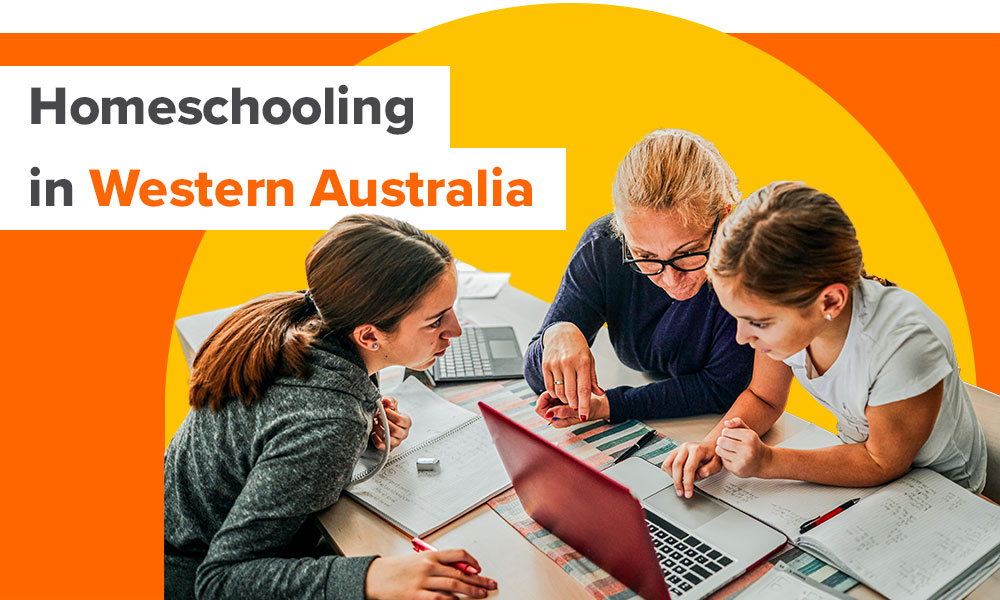Under the School Education Act (1990), you can choose to homeschool your child at any stage during their compulsory years of education (6-17). But first you must apply for a certificate of registration from the Western Australian Department of Education (DET).
This will be valid for the entire period of your child’s compulsory education unless you choose to enrol your child in school, or registration is cancelled under section 53 of the Act.

Registering for homeschooling in WA
An application form can be obtained from the Education Regional Office (unfortunately, it isn’t available online) and needs to be completed with your child’s age and year level, reasons for homeschooling and any special needs. You will also be required to submit the following documents as part of your application
- Records of your child’s educational history and previous attainment
- A copy of your child’s birth certificate or extract
- Any extant court orders
- Documentation that demonstrates your legal right to apply for registration (if you are not the legal guardian of your child)
If your child has previously been attending school, you will need to advise the principal in writing of your intention to register for homeschooling before your child ceases their enrolment at the school or within three days of non-attendance. An application for registration must be submitted within 14 days of the last day your child attended school.
When all of your documentation has been submitted, you’ll be issued with a certificate of homeschooling registration.
More information on the DET’s home education policy and procedures can be found here.
Requirements of homeschooling
From the date of registration, you’re entirely responsible for your child’s educational program and progress during their compulsory years of schooling or unless registration is cancelled. The program you develop must:
- Be based on the Western Australian Curriculum i.e. the core curriculum for primary education (Kindergarten to Year 6), secondary education (Years 7 to 10) or senior secondary education (Years 11 and 12).
- Meet the learning needs of your child.
- Ensure there is an adequate system for planning, supervising and recording teaching and learning experiences.
Records of implementing your child’s educational program must be kept to show how the program has been delivered and how the requirements for registration are being met.
The role of a home education moderator
Each year, an education moderator will visit your home to monitor and assess the learning program and progress for each child. Moderators will prepare a report on your child’s progress based on your records and their own assessment of the educational environment. You will be provided with a copy of this report once it’s made available.
A report will typically include:
- A general evaluation of your homeschooling program
- An indication of your child’s achievement
- Areas needing attention
- Suggested resources or strategies which could help support your child
- Answers to any questions raised in the meeting
According to the DET:
If there are concerns about the program or the child's educational progress, the moderator will include advice in the report and will arrange for an evaluation to ascertain whether the concern has been addressed. Further information on addressing concerns is provided in the form of an Expression of Concern.
How to show educational achievement or progress
According to the DET, home educators can demonstrate educational progress during moderator visits in some or all of the following ways:
- Showing educational programs or plans which identify core learning outcomes from the Western Australian Curriculum.
- Demonstrating evidence of progress in an online learning program i.e. a copy of results, an online progress report etc.
- Dated writing samples which show learning or progress over time.
- Samples of research projects which show planning, note-taking, draft-writing, editing and a final product.
- Completed projects which demonstrate learning achievements.
- A diary or other records of learning achievements over time.
- A reflective journal written by your child where they record what they’ve learned about a topic or describe a concept in detail.
- A verbal description from you or your child of home education experiences and achievements.
- Photos which demonstrate engagement in natural learning activities, supported by a description of the activity and commentary on what was learnt.
- A portfolio of creative pieces (art, design etc.).
- Video clips of drama performances, recitals or participation in concerts.
How Cluey supports homeschooling in Western Australia
Our flexible, online model means that your child can log in to our online learning platform from anywhere, utilising video, audio and collaborative whiteboard capabilities.
You can choose the areas you’d most like to focus on and specify your learning goals. Our programs can be tailored to your teaching philosophy and the needs of your child. What’s more, you’ll receive a report at the end of every session which can form part of your portfolio of learning progress.
Learn more about homeschooling support with Cluey >>
FAQs
What do I need to consider before I homeschool?
Although you need to eventually work out a learning plan and schedule, homeschooling is first and foremost an incredible time commitment. It’s important to understand the day-to-day realities of homeschooling and decide whether you have the time and dedication required to teach your child. Will homeschooling get in the way of paid work or other commitments? Do you have the patience and resources to teach full time?
How old must my child be before I register them?
Children are eligible to begin kindergarten (or register for homeschooling) if they turn five on or before July 31 of that year. They must be enrolled or registered for homeschooling by their sixth birthday.
What happens after I register?
Once you submit a written application and include all of your required documents (see above), your application will be assessed by the DET and you will (hopefully) be issued with a certificate of registration.
How long will the application process take?
Although every approval process is different depending on your individual circumstances, an average approval process from the time you submit your application is between 14 and 60 days.
What happens if my application for homeschooling registration is refused?
If your application is refused, you’ll be notified in writing and given a clear reason for refusal. You can seek an internal review of this decision via the DET within 14 days of the notice date.
What happens if they refuse my application for registration after an internal review?
If the authorised person conducting the internal review confirms the original recommendation that registration be refused, the DET will notify you in writing with the reasons for the recommendation.
How can I make sure I get approved?
The best way to ensure a positive outcome is to do your research on what’s required, gather your relevant documentation and prepare a detailed learning plan based on the Western Australian Curriculum.
Will I be monitored by inspectors while homeschooling?
A DET-appointed moderator will periodically meet you at your home or an alternative location to evaluate your program and its implementation, as well as learning progress to date. You will receive a written report from the moderator following this meeting. This will include areas of achievement, as well as areas needing attention.
In instances where your moderator has found cause for concern (i.e. your child is not showing progress, your program is not being implemented or there is an issue with your learning environment), they will advise the Regional Executive Director to issue a Cause for Concern notice. This will include a period in which you’re expected to address the areas for concern and a date for a follow up evaluation.
Can my registration for homeschooling be cancelled?
If the stated areas of concern haven’t been adequately addressed following a Cause for Concern notice and second evaluation, the Regional Executive Director will take steps to cancel your registration.
You can apply for a review of this decision via the Minister for Education, who will refer the appeal to a Home Education Advisory Panel to report on the matter.
What are the essential subjects/curriculum I need to teach?
Although there is no set homeschooling curriculum, you’ll be required to develop an educational program based on the Western Australian Curriculum. These include core literacy, numeracy and HSIE subjects. More information about the WA curriculum for each year group can be found here.
How much time should I spend on each subject?
You might find that a four day week works best, or five half days. You need to ensure you meet the requirements in the WA curriculum, but the way you teach it and the time you spend on each module is entirely up to you.
What if my child has special needs?
If you have a child who for any reason doesn’t fit the “ordinary” box, homeschooling could be a positive option. Homeschooling can often take the stress out of structured lessons, allowing children to learn at their own pace and in their own way. For special needs, always seek as much support as possible, both to ensure you’re teaching to your child’s unique needs, and to connect with other parents or teachers who might be experiencing similar challenges.
How do I plan my homeschool/learning program?
Many parents plan their own learning program based on the outcomes detailed in the WA CurriculumWA curriculum. There are also several out-of-the-box homeschooling programs, many of which are developed by education experts and based on different approaches and teaching philosophies. It’s important to ensure any programs or templates you rely on take into account the individual requirements of your state.
And of course Cluey offers homeschooling support programs.
How do I document my homeschooling progress/portfolio?
There’s no one way to document your homeschooling portfolio. You might put together a collection of work, which would look different depending on the age and ability of your child. A written diary or essay samples are one example. Maths worksheets, stories based on historical understanding and other creative, inquiry-based studies are other options.
Do I need formal teaching qualifications to homeschool?
You don’t need any formal training to become a homeschool teacher. As long as you meet the requirements and show evidence of learning, you’re set!
What do I do if I’m overwhelmed?
Will you be able to cope with the mammoth undertaking that is homeschooling? The short answer is yes — when there’s a will there’s a way. But it’s important to understand the realities of homeschooling and seek support in the form of outside tutoring if you feel yourself burning out.
Does my homeschooled child really need to complete Year 11 or 12?
Like mainstream education, progressing to a senior level is entirely up to you and your child. In Western Australia, homeschooled students who would like to qualify for a Western Australian Certificate of Education (WACE) must cease homeschooling and enrol in a government or independent school in order to sit their final exams.





